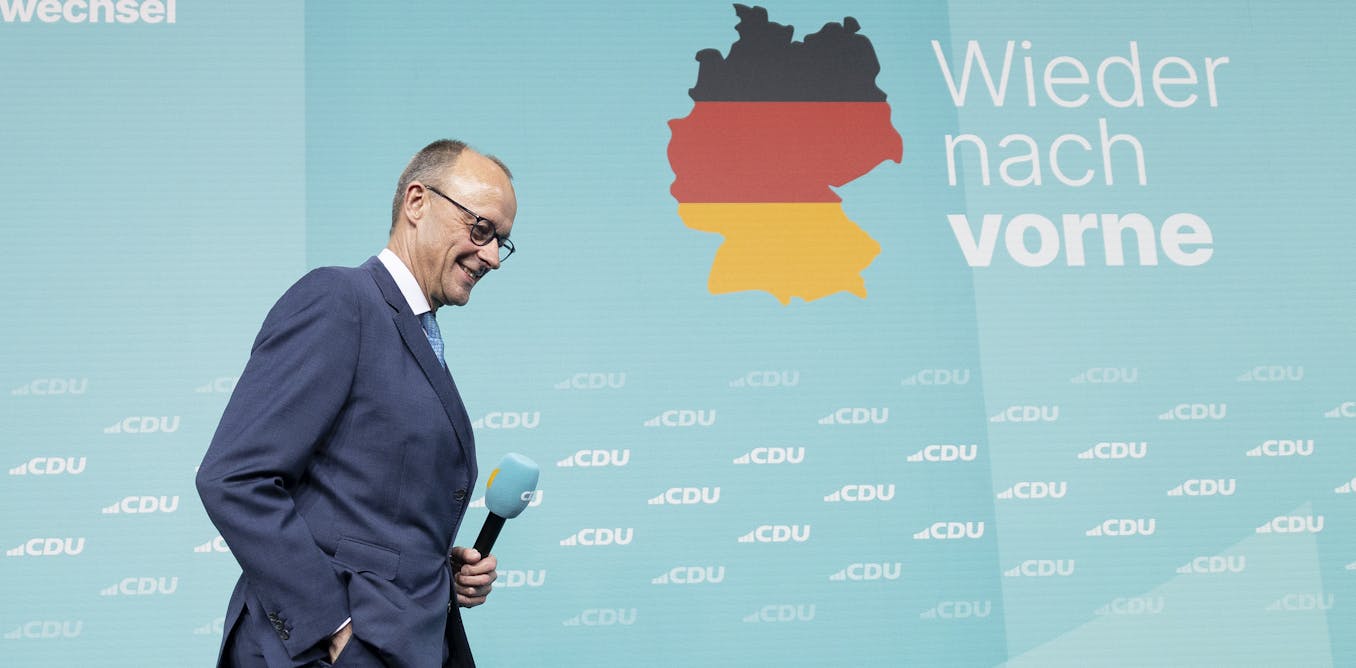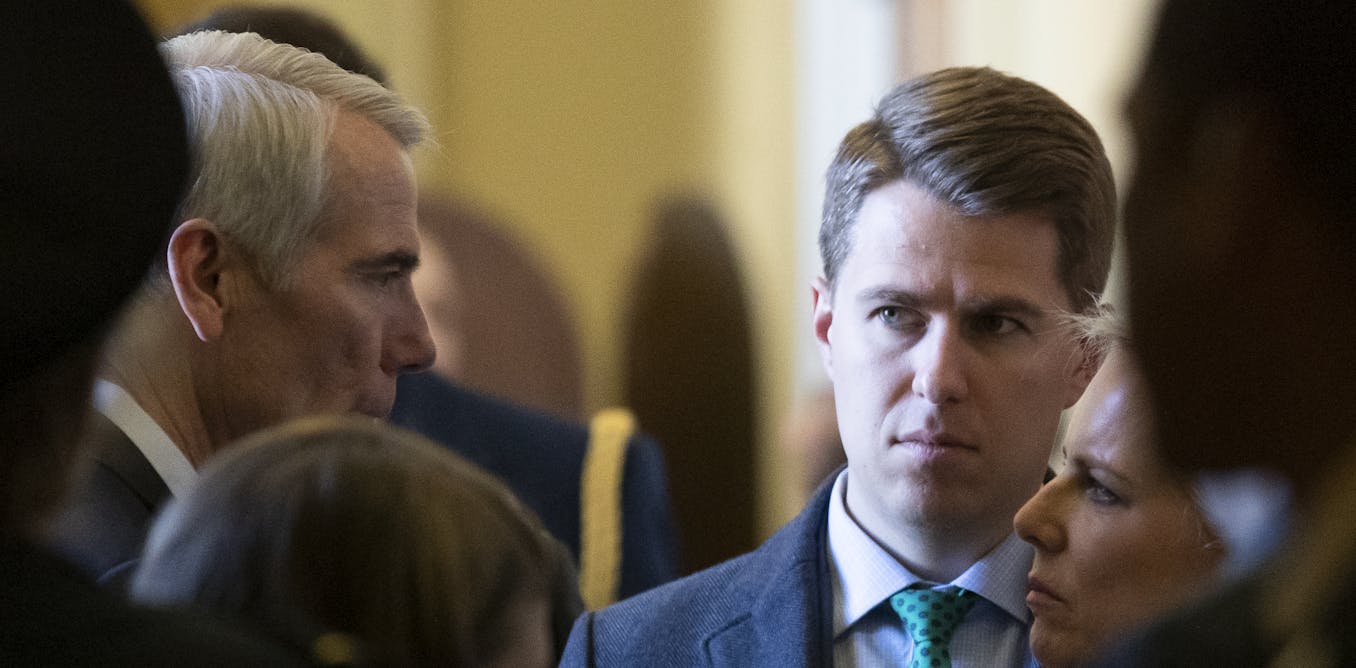Germany’s presumptive new chancellor, Friedrich Merz, faces challenges both at home and overseas following his conservative alliance’s election victory on Feb. 23, 2025.
A strong showing from the hard-right Alternative for Germany (AfD) – which Merz, in line with other mainstream German parties, refuses to countenance as a coalition party as part of an unofficial “firewall” against extremism – will make forming a functioning government tricky.
But in the moments after the election results, it was the future of the European Union and its relationship with America that was his immediate focus: “My absolute priority will be to strengthen Europe as quickly as possible so that, step by step, we can really achieve independence from the USA.”
To understand why that is such a concern for Germany now and what “real independence” from Washington means, The Conversation U.S. turned to Garret Martin, an expert on U.S.-Europe relations at American University, for answers.
What prompted Merz’s ‘real independence’ line?
Presumably it was a response to a series of recent announcements and actions by the Trump administration that have shocked the German political establishment. This includes the sudden revelation that the U.S. would negotiate directly with Russia to end the war in Ukraine, but seemingly without the Europeans or Ukrainians involved. That development went down like a lead balloon in Berlin, especially considering Germany’s significant financial support of Kyiv since 2022.
Moreover, the German establishment has also frowned at a series of recent declarations by members of the Trump administration. Vice President JD Vance’s speech at the Munich Security Conference, in which he harshly criticized Europe for allegedly undermining freedom of expression, provoked clear pushback from German leaders. Trump, for his part, hardly endeared himself to his German allies when he denounced Ukrainian President Volodymyr Zelenskyy as a “dictator.”
And, of course, Elon Musk’s interference in the German elections – as well as his open support for the far-right Alternative for Germany – provoked a fierce response from Merz. The then-candidate promised that Musk would need to be prepared for legal consequences for his meddling.
Sean Gallup/Getty Images
How would this ‘real independence’ be achieved?
Defining what “real independence” means and being able to implement such a drastic change in transatlantic relations will be a tall order. If by “real independence” Merz means that Germany would no longer rely on the U.S. for its security, then that would require several major steps.
Merz would first need to convince his likely coalition partners, the Social Democrats, that this is the right goal. After all, German governments are bound by very detailed coalition agreements. Second, Merz would need to significantly increase German defense spending. As it stands, Germany’s annual defense budget is slightly over US$90 billion, or 2% of its GDP. But a recent study by the economic think tank Bruegel suggests Berlin would need to increase its budget by $145 billion annually to defend Europe without the assistance of the U.S.
But to achieve this, Merz will likely need to increase defense spending by such a level that it will contravene the country’s “debt brake.” This 2009 constitutional rule essentially caps the annual deficit that the government can take on. But overturning this mechanism would require a two-thirds majority in both chambers of the German Parliament. Merz’s Christian Democratic Union/Christian Social Union party won 28.6% of the vote – and even with the support of the country’s main center-left party, the Social Democrats, Merz will fall short of the parliamentary votes needed.
Finally, “real independence” would also require convincing other European Union partners to join him down that path. Assuming that the Trump administration continues its current trajectory and further undermines NATO, the EU would have to step in to become a more prominent security actor for the continent. It might also require, as Merz hinted, that the United Kingdom and France be ready to share their nuclear weapons, since the U.S. may not be trusted anymore to defend NATO countries.
All of these steps would cover “real independence” only in the security sphere and not touch other crucial policy areas, such as trade and energy. And that would be an equally tall order given the level of economic ties binding Germany to the U.S., as well as the looming threat of tariffs.
What does this mean for German-US relations?
Merz’s “real independence” statement would have been noteworthy coming from any German chancellor. But it is even more striking when one considers the fact that Merz is a committed transatlanticist who deeply admires the U.S. and counts Ronald Reagan as one of his role models.
At 69, Merz came of age during the final years of the Cold War, when the U.S. played a key role in enabling German reunification. He worked for years for Atlantik-Brücke, a lobbying group pushing for closer transatlantic ties. And he has, by his own account, traveled more than 100 times to the U.S.
Independence will not likely mean a complete divorce between the U.S. and Germany – the ties binding the two countries, whether economic, cultural or political, run too deep. However, we can expect that Berlin will not hesitate to take a more combative approach toward Washington when necessary, so to protect German and European interests. As Merz pointed out, it is clear that the Trump administration does “not care much about the fate of Europe.”
What does this signal for Merz’s view of Germany’s position in the EU?
Merz’s win will certainly lead to important shifts in Germany’s position in the EU, and could be a major boost for a union in need of leadership. His predecessor, Olaf Scholz, was hampered by a weak economy, divisions within his coalition and indecisive leadership in Europe. Moreover, poor relations with French President Emmanuel Macron also stalled the Franco-German partnership, normally a key engine of leadership in the EU.
Merz certainly plans to take a very distinct approach toward the EU than his predecessor. His calls for “real independence” will certainly be very welcome in France, which has long called for Europe to be more responsible for its own security. As such, it opens up the possibility of far closer ties between Paris and Berlin than we saw in recent years. Moreover, Merz, with his more hawkish position toward Russia, could be counted on to provide greater support for Ukraine.




